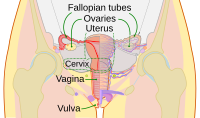
Photo from wikipedia
Background: Demand for male-to-female gender-affirmation surgery is rising. Creation of a vaginal vault and a feminine vulva remains challenging, especially in circumcised patients. The authors present the 15-year results of… Click to show full abstract
Background: Demand for male-to-female gender-affirmation surgery is rising. Creation of a vaginal vault and a feminine vulva remains challenging, especially in circumcised patients. The authors present the 15-year results of the technique developed by the senior author (S.M.). Methods: A retrospective case review was performed of all penile inversion vaginoplasties carried out by the senior author between 2003 and 2017. Age, hormonal therapy time, body mass index, smoking, diabetes, circumcision, and the need for full-thickness skin grafts to lengthen the vaginal vault were investigated as potential risk factors for postoperative complications. Results: A total of 384 penile inversion vaginoplasties were retained, with 85.7 percent of patients requiring a full-thickness skin graft to lengthen the vaginal vault. Rectum perforation occurred in six patients (1.6 percent). Early revisions were necessary in 8.4 percent of patients and late revision surgery was performed in 37.1 percent of cases. There was no independent risk factor for early complications. Diabetes was an independent risk factor for late revision surgery. After vaginoplasty, 97.2 percent of patients reported being able to engage in penetrative intercourse, and 83.4 percent of patients reported having orgasms. Conclusions: Vaginoplasty is possible in all trans women, with most patients being able to engage in penetrative intercourse and reach an orgasm. To reach the desired depth of 14 cm, the neovaginal vault is usually lined with full-thickness skin grafts from the scrotum and/or abdomen. Diabetes was the only independent risk factor for revision surgery. Rectal tears are a rare complication and can usually be managed conservatively. CLINICAL QUESTION/LEVEL OF EVIDENCE: Therapeutic, IV.
Journal Title: Plastic and Reconstructive Surgery
Year Published: 2021
Link to full text (if available)
Share on Social Media: Sign Up to like & get
recommendations!